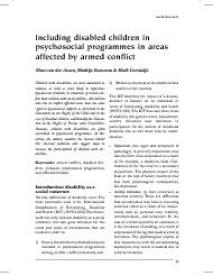Including disabled children in psychosocial programmes in areas affected by armed conflict
Children with disabilities are more vulnerable to violence, as well as more likely to experience psychosocial problems in situations of armed conflict than children with no disabilities. All children who live in conflict affected areas have the same rights to psychosocial support, as enshrined in the Convention on the Rights of the Child and in the case of disabled children, additionally the Convention on the Rights of Persons with Disabilities. However, children with disabilities are often overlooked in psychosocial programmes. In this article, the authors examine the reasons behind this observed exclusion and suggest ways to increase the participation of children with disabilities.
Geachte bezoeker,
De informatie die u nu opvraagt, kan door psychotraumanet niet aan u worden getoond. Dit kan verschillende redenen hebben,
waarvan (bescherming van het) auteursrecht de meeste voorkomende is. Wanneer het mogelijk is om u door te verwijzen naar de bron
van deze informatie, dan ziet u hier onder een link naar die plek.
Als er geen link staat, kunt u contact opnemen met de bibliotheek,
die u verder op weg kan helpen.
Met vriendelijke groet,
Het psychotraumanet-team.
Reference:
Nina von der Assen, Mathijs Euwema, Huib Cornielje | 2010
In: Intervention: the international journal of mental health, psychosocial work and counselling in areas of armed conflict, ISSN 1571-8883 | 8 | 1 | 29-39
http://www.interventionjournal.com/sites/default/files/WTF148%20Including%20dsiabled%20children_Von%20der%20Assen.pdf
In: Intervention: the international journal of mental health, psychosocial work and counselling in areas of armed conflict, ISSN 1571-8883 | 8 | 1 | 29-39
http://www.interventionjournal.com/sites/default/files/WTF148%20Including%20dsiabled%20children_Von%20der%20Assen.pdf


